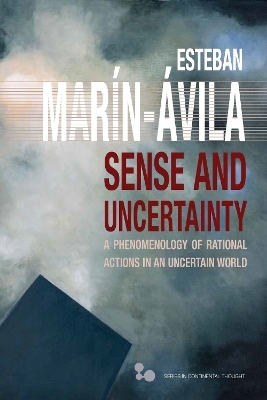
Sense and Uncertainty
A Phenomenology of Rational Actions in an Uncertain World
Seiten
2025
Ohio University Press (Verlag)
978-0-8214-2577-0 (ISBN)
Ohio University Press (Verlag)
978-0-8214-2577-0 (ISBN)
- Noch nicht erschienen (ca. Januar 2025)
- Versandkostenfrei innerhalb Deutschlands
- Auch auf Rechnung
- Verfügbarkeit in der Filiale vor Ort prüfen
- Artikel merken
Drawing primarily on the phenomenological work of Edmund Husserl and Luis Villoro, Sense and Uncertainty explores the possibility and conditions of rational, practical agency in our non-ideal world, characterized by forms of irrationality, violence, and oppression.
Sense and Uncertainty presents a phenomenological account of the possibility of rational action amid the challenges posed by violence, volatile conditions, uncertain outcomes, and social dependence. The book asks us to consider the following:
We are often forced through violence to do things that do not make sense for us except to avoid retaliations, punishments, or the various evils that others might inflict on us.
We inhabit a world that escapes our control. This involves living in uncertainty concerning the things that we might suffer and do, that is, the things that might happen to us and the results of our actions.
We are dependent on others and collaborate with them in ways that make it impossible to fully understand the sense of our own actions and practical intentions.
Rationality involves insightful thinking about the world and our emotional responses to it, something we do in our everyday lives, whether consciously or without awareness. Sense and Uncertainty attempts to make explicit and to clarify the implications of this conceptually neglected aspect of our rationality: namely, that it involves paying attention to our emotions and values. An ethical life in which we can act meaningfully in the face of violence and uncertainty, and in which we can make sense of our vulnerability and dependence on others, demands that we think about and seek insight into how we love, why we hope, and in whom or in what we trust.
The phenomenological ethics presented in Sense and Uncertainty draws on the works of Western canonical philosophers like Edmund Husserl, Max Scheler, Simone de Beauvoir, Anthony Steinbock, and José Ortega y Gasset, as well as on those of Latin American thinkers such as Luis Villoro, Rita Segato, and Augusto Salazar Bondy, among others.
Sense and Uncertainty presents a phenomenological account of the possibility of rational action amid the challenges posed by violence, volatile conditions, uncertain outcomes, and social dependence. The book asks us to consider the following:
We are often forced through violence to do things that do not make sense for us except to avoid retaliations, punishments, or the various evils that others might inflict on us.
We inhabit a world that escapes our control. This involves living in uncertainty concerning the things that we might suffer and do, that is, the things that might happen to us and the results of our actions.
We are dependent on others and collaborate with them in ways that make it impossible to fully understand the sense of our own actions and practical intentions.
Rationality involves insightful thinking about the world and our emotional responses to it, something we do in our everyday lives, whether consciously or without awareness. Sense and Uncertainty attempts to make explicit and to clarify the implications of this conceptually neglected aspect of our rationality: namely, that it involves paying attention to our emotions and values. An ethical life in which we can act meaningfully in the face of violence and uncertainty, and in which we can make sense of our vulnerability and dependence on others, demands that we think about and seek insight into how we love, why we hope, and in whom or in what we trust.
The phenomenological ethics presented in Sense and Uncertainty draws on the works of Western canonical philosophers like Edmund Husserl, Max Scheler, Simone de Beauvoir, Anthony Steinbock, and José Ortega y Gasset, as well as on those of Latin American thinkers such as Luis Villoro, Rita Segato, and Augusto Salazar Bondy, among others.
Esteban Marín-Ávila is a professor at the Institute of Philosophy of Universidad Veracruzana in Xalapa, Veracruz, Mexico. His publications include articles and book chapters on phenomenology, ethics, axiology, social ontology, social normativity, philosophy of violence, social emotions, critical theory, human rights, and Latin American philosophy.
| Erscheint lt. Verlag | 21.1.2025 |
|---|---|
| Reihe/Serie | Series in Continental Thought |
| Verlagsort | Athens |
| Sprache | englisch |
| Maße | 152 x 229 mm |
| Themenwelt | Geisteswissenschaften ► Philosophie ► Philosophie der Neuzeit |
| ISBN-10 | 0-8214-2577-3 / 0821425773 |
| ISBN-13 | 978-0-8214-2577-0 / 9780821425770 |
| Zustand | Neuware |
| Haben Sie eine Frage zum Produkt? |
Mehr entdecken
aus dem Bereich
aus dem Bereich


